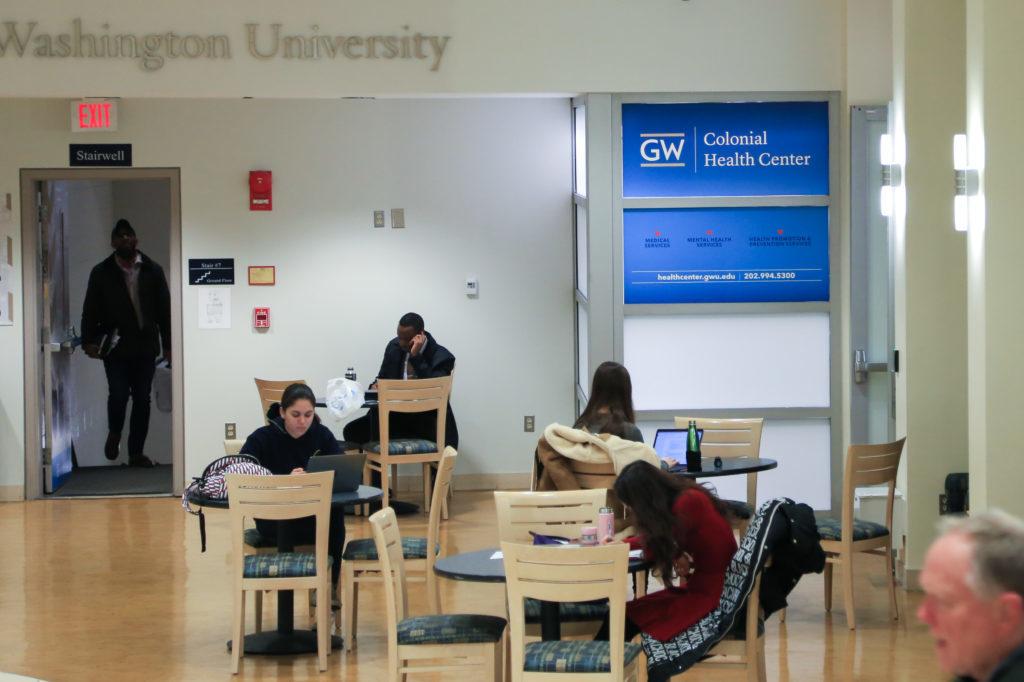Talking about society and politics in 2018 can quickly turn divisive, but a new group in the Colonial Health Center is seeking to ensure that “challenging conversations” can successfully occur on campus.
Mental Health Services is hosting a weekly “healthy sociopolitical dialogues” group aimed at encouraging students to discuss complex issues and subsequently alleviate some of the stress and anxiety they may feel discussing hot-button political and social topics.
Students can join the weekly sessions at the CHC every Monday from 1 to 2:30 p.m. Each session is student-led with members first agreeing on the topics to be covered in the meeting. The size of the sessions is capped at eight students, Gillian Berry, the interim director of Mental Health Services, said.
“It’s no secret that politics can be divisive, whether it be on campus or at a family dinner table or between a group of friends.”
The group is one of several the CHC started last fall to tackle issues that plague student’s mental health, including groups on spirituality, substance abuse, self-acceptance and body image. Berry said the sessions were developed based on feedback from students to counselors, focus groups and the Care Network, a program that allows students to anonymously report peers facing mental health issues.
“Being informed by the growing body of literature and work on other universities campuses, groups such as this one have been surfacing in many guises with differing titles, but all with the theme of alleviating and decreasing stress and anxiety experienced by some students,” she said in an email.
The group will create greater self-awareness and understanding of diverse perspectives among participants with the goal of generating “an environment where challenging conversations can occur,” Berry said.
She added that similar groups at other universities are based in academic departments or multicultural centers, but officials decided to hold this group in the CHC because it was “an appropriate place to support and address any possible stress, anxiety and anger that may occur as a result of such dialogues.”
Student leaders from political groups on campus said the discussion sessions could be an effective way to open up dialogue between students with different backgrounds and views, especially on a campus where its often difficult to have constructive political debate.
Robert Dickson, the vice president of communications for the GW College Democrats, said while he had not heard about the group, it could start conversation at GW where more students are interested in politics than at most other universities.
“It’s no secret that politics can be divisive, whether it be on campus or at a family dinner table or between a group of friends,” he said. “Creating a healthy outlet for members of our community to talk about why they advocate for a certain belief or why they support a specific candidate or elected official is a great way to start that conversation.”
Dickson said he plans to promote the group to the College Democrats leadership and members, in case politically-minded students are interested in attending the sessions.
“We are lucky to have a large membership base and we would love to have our members attend these meetings and add to the constructive conversations that happen on campus,” he said.
Dickson said a group that discusses sociopolitical issues will only work if everyone involved is respectful to one another.
“Whether it’s about a candidate or a policy issue, there needs to be a bottom line of respect,” he said. “An environment where students feel that their beliefs are encouraged and respected – that they are not just going to be immediately mocked or cackled at – is the first guideline.”
Student organizations have been trying to bridge the political divide on campus in recent years by hosting bipartisan debates, panels and discussions with groups that hold differing political views.
“Getting groups together to dialog about issues with a trained professional is always a good idea.”
Sara Dougherty, the director of public relations for the GW College Republicans, said listening to diverse opinions is especially important in college, when students should be exploring and debating ideas.
“I think there needs to be a more robust and supportive offering of mental health services to students more generally,” she said. “I also think that there is a need for critical, civil and constructive political discourse.”
Kirt Patrick McClellan-Pacheco, the associate director of the University of Miami’s Counseling Center, said his university doesn’t have a similar group, but it could be an effective resource to strengthen ties within the student body.
“This kind of group could help students feel understood, increase their awareness about others, and feel less isolated in their ideas and thoughts,” he said. “Getting groups together to dialog about issues with a trained professional is always a good idea.”





